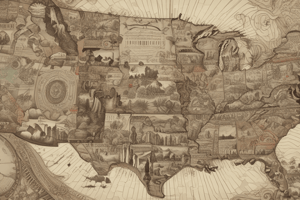Podcast
Questions and Answers
What do you understand by political theory? Describe its nature and importance?
What do you understand by political theory? Describe its nature and importance?
Political theory is a branch of knowledge that studies the concepts, principles, and ideas that underpin political systems and governance. It aims to understand and analyze the nature of power, authority, justice, freedom, and other fundamental political concepts. Political theory is essential because it provides a framework for understanding political phenomena, analyzing different political systems, and developing informed political opinions.
Critically explain the social contract theory of the origin of the state?
Critically explain the social contract theory of the origin of the state?
The social contract theory posits that the state arises from an agreement among individuals to surrender some of their natural freedoms in exchange for the benefits of living in a society with laws and order. It argues that individuals in a state of nature, lacking a common enforcer, would face challenges like insecurity, disorder, and a lack of protection for their rights. Thus, they agree to establish a government to provide these essential services.
Explain the evolutionary theory of the origin of the state?
Explain the evolutionary theory of the origin of the state?
The evolutionary theory of the origin of the state argues that states emerged gradually out of more primitive forms of social organization. It maintains that early human societies were small, egalitarian, and loosely structured. Over time, these societies grew in complexity and size, requiring more centralized authority and governance. This gradual evolution led to the emergence of states as a natural progression in societal organization.
What is political theory?
What is political theory?
Write the characteristics of traditional political theory?
Write the characteristics of traditional political theory?
Write the characteristics of modern political theory?
Write the characteristics of modern political theory?
Describe the essential elements of a state?
Describe the essential elements of a state?
Describe The importance of political theory?
Describe The importance of political theory?
Describe the divine theory of the state?
Describe the divine theory of the state?
Describe the force theory of the origin of the state?
Describe the force theory of the origin of the state?
Define liberty.
Define liberty.
Explain the meaning of Equality.
Explain the meaning of Equality.
What is the relation between liberty and equality?
What is the relation between liberty and equality?
Define sovereignty.
Define sovereignty.
What is pluralism?
What is pluralism?
Define Democracy.
Define Democracy.
Explain distributive justice.
Explain distributive justice.
Describe the Marxist theory of democracy.
Describe the Marxist theory of democracy.
Describe the liberal theory of democracy.
Describe the liberal theory of democracy.
What is liberty, describe its types?
What is liberty, describe its types?
What is equality, describe its types?
What is equality, describe its types?
What is sovereignty, describe its types?
What is sovereignty, describe its types?
Critically interpret Austin's sovereignty theory.
Critically interpret Austin's sovereignty theory.
Define democracy and describe its merits and demerits.
Define democracy and describe its merits and demerits.
Flashcards
Political Theory
Political Theory
The study of fundamental questions about government, politics, and society.
Social Contract Theory
Social Contract Theory
A theory that suggests governments derive legitimacy from the agreement of the governed.
Evolutionary Theory of State Origin
Evolutionary Theory of State Origin
A theory proposing that states develop gradually over time.
Liberty
Liberty
Signup and view all the flashcards
Equality
Equality
Signup and view all the flashcards
Sovereignty
Sovereignty
Signup and view all the flashcards
Democracy
Democracy
Signup and view all the flashcards
Distributive Justice
Distributive Justice
Signup and view all the flashcards
Marxist theory of democracy
Marxist theory of democracy
Signup and view all the flashcards
Liberal theory of democracy
Liberal theory of democracy
Signup and view all the flashcards
Study Notes
Political Science - Long Answer Questions
- Political theory: Understanding and describing its nature and importance
- Social contract theory of state origin: A critical explanation, examining its origins
- Evolutionary theory of state origin: Explanation of the theory
Political Science - Short Answer Questions
- Definition of political theory
- Characteristics of traditional political theory
- Characteristics of modern political theory
- Essential elements of a state
- Importance of political theory
- Divine theory of the state
Additional Questions (Page 2)
- Force theory of origin of the state
- Definition of liberty
- Explanation of equality
- Relationship between liberty and equality
- Definition of sovereignty
- Definition of pluralism
- Definition of democracy
- Distributive justice
- Marxist theory of democracy
- Liberal theory of democracy
Additional Questions (Page 3)
- Critical interpretation of Austin's sovereignty theory
- Definition, merits, and demerits of democracy
- Characteristics and necessary conditions for a successful democracy
- Definition and types of justice
Studying That Suits You
Use AI to generate personalized quizzes and flashcards to suit your learning preferences.
Related Documents
Description
This quiz covers essential concepts in political science, including political theory, state origin theories, and key characteristics of democracy and liberty. It aims to examine the critical aspects of both contemporary and traditional political thought. Test your understanding of political concepts and theories through a variety of long and short answer questions.




